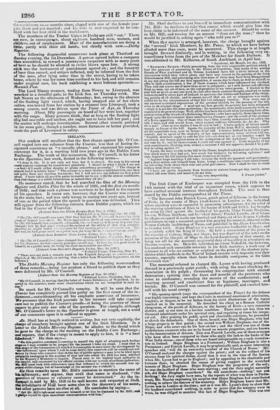IRELAND.
Our readers will recollect that the first charge against Mr. O'Con-
nell copied into our columns from the Courier, was that of having de- signated consistency as "a rascally phrase," and expressed his supreme Tom-tempt for it, at a meeting held two years ago at the Dublin Corn Exchange. The truth of this accusation, Mr. O'Connell, in his letter to the Spectator, last week, denied in the following terms-
- t deny it, Sir. It is not only not true, but it is absurd. No man in his senses .maid express contempt for consistency generally. I should be what I think I am not --a fool—if I could either despise or praise consistency generally." " The charge is absearl,but it is totally false:' The accuser is a mere inventor and fabricator, and does met quote from any existing document ; but I will not rest my defence on that point
aline. I have taken nil possible pains to enable me to say. with the utmost confidence, Hat this charge is a wilful fabrication, as iudeed they all arc."
He moreover stated, that be bad searched the files of the Morning Register and Dublin Pilot for the whole of 1831, and the first six months of 1832 ; and that such a phrase was nowhere to be found in the reports of his speeches. It turns out, however, that the Courier was correct in the main fact; and was only wrong in stating two years ago, instead of one, as the period when the speech in question was delivered. This will appear from the following extracts from Dublin papers, which we find in the Courier of Thursday.
(Extract from the Dublin Evening Post, Dec. I, 1932.) " Political Union, Thursday, Nor. 29,1932. He (Mr. O'Connell) was sorry that they had not Mr. R'use's aid in carrying their ?Lure of Repeal into etreet. Mr. Wyse appeared to dwell on one arrangement, wh;c11 he (Mr. O'Connell) had originally advocattsl, viz.—a Local as well as an Imperial Par- iiiment; but lie hall sine;• changed his opinion of the utility of that step. notwith- aling he might forfeit Li, character for that rascally priurFple coarsh oey. The fart was, he toole great credit, as a public man, for being the nue,t incoasis!ent one alive." (Extract from Saunders' News Letter, Friday. Nev. 30, " Political U niee, T ersdar, Nov. 2). " ifs (Mr. O'Connell) had since changed his opinion, notwiths ta: slims be mi_fl.t for- it his character for that rascally principle, consistency. In fact, he took great credit to
reitaself, as a public man, fur being the most inconsistent one alive."
(Extract from Stewart's Dispatch, Friday, Nov. 30, 1932.) " Political Union, Thursday, Nov. 2). There was not such a rascally word in the English language as consistency."— (Speech of Mr. O'Connell, on moving that a letter from Watertbrd be„ inserted on the ertiuntes.) The Dublin Morning Register has only the followine-. memorandum of these remarks,—being too prudent a friend to publish them as they were delivered by Mr. O'Connell. (Extract from the Morning Register of Nov. 30 1832.)
" Political Union ,Thursday. Nov. 29.
"Mr O'Connell, in moving that the letter of James Delahunte, of Waterford, be in- serted in the minutes, made some observations which we are compelled to omit to- SoSo much for Mr. O'Connell's veracity. It will be seen that the Courier has completely proved him guilty on the first count of the in - erittment—notwithstanding all his emphatic assertions of innocence. We presume that the Irish journals in his interest will take especial sere not to publish the Courier's proofs—it being the practice of those rapers to give only one side of the question. For example, although Mr. O'Connell's letter to the Spectator is given at length, not a word of war comments upon it is suffered to appear.


















 Previous page
Previous page